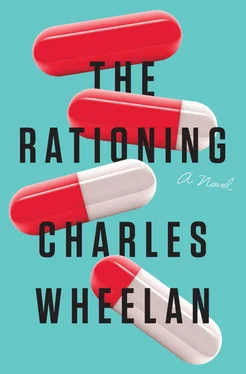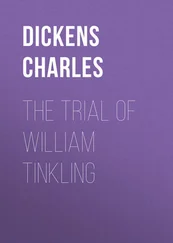Her name was Jenna. She had her Ph.D. from the Harvard School of Public Health and we did end up going for a walk. Jenna was thoughtful and smart. I have often wondered what would have happened if the loaner employee from the CDC who opened the door and said he had taken Huke’s course had been some overweight guy with a poorly trimmed beard and bad teeth. “That’s really cool,” I would have said, “but now is not a great time.” Instead, I was instantly attracted to Jenna and I wanted her to sit down in that conference room with me. I will spare you the rest of our origin story, but it does play a role in this larger narrative. What if Jenna were not so cute? I still ask her that sometimes: “What if you were a hairy guy who smelled bad? What if we had not gone on that walk?”
THE CHINESE AMBASSADOR LEFT THE EMBASSY FOR THE White House shortly after two Eastern Time. The Washington police offered his black sedan an escort. The press corps, who had been camped outside the embassy, scrambled into vehicles to follow him, creating a train of vehicles that looked like a funeral procession. The President and senior advisers watched the live coverage from the conference room on Air Force One. As the Ambassador’s sedan made its way slowly through Washington traffic, the Strategist said, “He could have just e-mailed the fucking thing.”
The U.S. intelligence agencies had gathered a great deal of raw information on the Chinese deliberations around their proposal. There were sharp disagreements within the Chinese leadership over what the offer ought to be, making it difficult for U.S. analysts to discern which faction would prevail. As Yale historian Mason Freeman has explained in his excellent book on the subject, the Outbreak came at a time of political intrigue within the Chinese leadership. President Xing was being challenged from within by a group of hard-liners, including some of the top military leaders, who were urging him to take a more aggressive stance in Southeast Asia. (The use of the phrase “sphere of influence” in the Ambassador’s remarks, however inelegant it may have felt to the American audience, was meant for Beijing listeners.) The hard-liners considered the Outbreak a heaven-sent opportunity for China to cement its role as a superpower on par with the United States—a role that would be severely hampered by the South China Sea Agreement.
A separate faction within the Chinese leadership, the “pragmatists,” as U.S. intelligence analysts would come to call them, were worried that if the Dormigen terms were too onerous, the U.S. leadership would balk at the deal. (When the President had declared in his speech that morning that the nation might get through the Outbreak without any incremental deaths, it had seriously strengthened the hand of the pragmatists.) Many of the pragmatists had spent significant time in the United States, often as university students. They recognized the likely backlash that would result from any diplomatic offer that felt extortionate to the American public. Nobody likes to be charged $25 for a bottle of water, even in the desert. A cursory search of the psychology literature would have alerted the Beijing bureaucrats to the fact that humans have a profound aversion to deals they perceive to be grossly unfair, and Americans can be a sanctimonious bunch—even relative to other humans on the planet.
Chinese intelligence operatives were reporting back to Beijing that the American President’s senior foreign policy advisers were pressuring him to stick with the South China Sea Agreement. Much of this information was deliberately leaked to the Chinese. The American intelligence agencies did not know about the power struggle going on around President Xing. However, they did assume, correctly it would turn out, that making the U.S. President appear willing to accept large numbers of American casualties would strengthen his bargaining position with the Chinese government.
In the end, the hard-liners in Beijing won out, mostly for reasons to do with Chinese domestic politics. President Xing was acutely aware of the backlash that the whiff of Chinese opportunism might create among the American public. (Because of his fondness for American westerns, he considered himself somewhat of an expert on the American psyche.) He had also spent more than five years in the U.S. getting his doctorate in engineering at MIT. His understanding of American public opinion was far more sophisticated than that of the generals urging him to take maximum advantage of the Dormigen shortage. But Xing did not feel he had a sufficiently strong grasp on power to face down the military establishment, who were united on this issue. Although President Xing has never spoken publicly about his decision regarding the contents of the “Friendship Agreement,” some advisers have since intimated that he knew it was likely to be rejected. To solidify his grasp on power, President Xing gave the military hard-liners what they wanted, even as he knew they were making a major strategic blunder.
The Chinese Ambassador’s black sedan pulled into the West Gate of the White House. On the U.S. end, there had been a scramble to determine who would receive the document. The Secretary of State and the National Security Adviser were in Hawaii with the President. The Vice President was ultimately designated to meet the Ambassador as he arrived. There was a brief handshake, after which the Chinese Ambassador handed over a black binder. The Vice President turned abruptly and walked back into the White House, leaving the Chinese Ambassador standing somewhat awkwardly near his car. There was no deliberate snub intended. Rather, the Vice President was under strict instructions to have the document scanned and distributed as quickly as possible. As the Strategist had sardonically observed, it would have been much easier if the Chinese had e-mailed an electronic version.
On Air Force One, the President and his senior advisers waited anxiously as the Chinese proposal was printed and copied. Only a few minutes after the awkward handoff at the White House, a State Department aide hustled into the conference room with multiple copies, still warm. She passed them around the table; the principals began to read. The Strategist was the first to speak, to no one in particular: “You’ve got to be kidding me.”
The Secretary of State said, “This is good. This is good for us.”
“It does make the decision easier,” the President replied. After just a few pages, it was clear that the Chinese “Friendship Agreement” sought to neuter the entire American presence in East Asia. There were several fluffy paragraphs about providing Dormigen in America’s time of need, but then the document changed tone entirely, listing demand after demand. The United States would have to withdraw immediately from the South China Sea Agreement and “disavow any such aggressive collective agreements in the region for a period of twenty years.”
“We knew they were going to make us scrap South China Sea,” the Chief of Staff said.
“Keep reading,” the President said. The agreement demanded that the United States withdraw all troops from South Korea and Japan within eighteen months. The U.S. would have to pledge “not to meddle in domestic Chinese decisions affecting economic development.”
“I don’t even know what that means. What does that mean?” the Communications Director asked.
The President answered, “That means no environmental restrictions, no leaning on them for trading in endangered species. It’s a catch-all for anytime we try to make them behave like responsible members of the global community.”
“Should I start drafting a statement?” the Communications Director asked.
“Let me finish reading,” the President said.
The Strategist blurted out, “Oh, my God, this is gold. Check out page thirteen, last paragraph.”
Читать дальше












